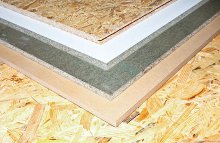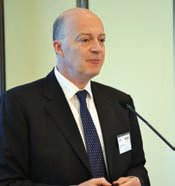Compulsory E1 in Europe – a defence
3 November 2015Mr Clive Pinnington, the new, and first, managing director of the European Panel Federation, finds that not all publicity is good publicity – especially when it comes via a TV news programme that promoted alarmist views on emissions from wood products.
In May 2015, wood based products were featured on CBS television news. Happy days? Unfortunately not.
From a wood industry perspective, the news feature was for all the wrong reasons, with laminate flooring (originating from China) exposed as being out of specification in terms of emissions.
What followed next was classic consumerdriven fall-out, with the flooring-carrying retail chain's ceo forced to step down as Lumber Liquidators' share price tumbled.
Product was removed from shelves and the US Consumer Products Safety Commission decided to investigate. It remains a concern that this edition of the US show 60 Minutes may have a negative trickle-down effect on correctly manufactured and certified product. So is this exposé a nightmare for legitimate and reliable manufacturers? Perhaps it might become one, but there is a silver lining to be found to this sorry tale, at least in Europe.
However, the European wood based panel industry had already voluntarily committed, in 2007, to the manufacture of all panel products to E1 quality, this being the recommended safe level according to European standards.
This commitment was enshrined via the European Panel Federation (EPF) and signing up to it became a core principle of membership in the industry's federation. Countries such as Italy and Denmark went one step further, making E1 a legal requirement for all panels and furniture products intended for indoor use.
Yet doubts on how to enforce this throughout Europe remained, especially with regard to imported products.
These developments in Europe, and recent events in North America, preyed on the mind of Dr Paolo Fantoni, fifth generation owner of Italian panel and furniture manufacturer Fantoni Group: So much so that when he had the chance to do something about it, he acted.
In June 2015, Dr Fantoni became the new chairman of the EPF and in his inaugural address to the federation's General Assembly he called for all members, national institutions and collaborating institutes to pull together to make E1 compulsory in all European countries.
In so doing, Dr Fantoni focused attention especially on imports that might come into Europe and which do not conform to European requirements for emissions.
"All European families deserve to feel that the furniture and wood based products that they buy for their home are absolutely safe and we are determined to do everything we can to ensure this.
"We have long since voluntarily committed to this, but now we need to go further. We want to ensure that panel and furniture imports are held to the same minimum E1 standards that have kept us safe and healthy," said Dr Fantoni.
Discussions have already begun on how to make E1 a legal obligation in all EU-28 member states, while pan-European legislation is also on the table. If regulators and law makers react positively to this key industry initiative, their opinions having been sharpened by Lumber Liquidators, then perhaps some good will indeed have come from this débacle.
One thing is clear, namely that this is being done to the overwhelming benefit of the consumer. The wood based panel industry is legitimately proud of Dr Fantoni's initiative to make E1 compulsory in Europe and relishes the opportunity to turn his vision into reality.



